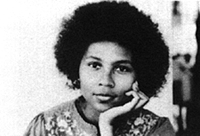

This week, two seasoned scholars will visit the College in observation of Black History Month.
bell hooks, a feminist scholar, author and social critic, will lecture at Afrikan Heritage House Monday She will also discuss her newest book, Remembered Rapture: The Writer at Work, at the Co-op Bookstore Sunday.

Originally born as Gloria Watkins, hooks named herself after her maternal great-grandmother Bell Hooks, with whom she associates the courage and ability to speak one’s mind. In only 15 years, hooks has published 16 books. Her first book was a race-conscious feminist text entitled Ain’t I a Woman (1981), which was included in Publishers’ Weekly’s “top 20 most important women’s books of the last 20 years.” A women’s studies professor here in 1988, hooks later joined the English department of City College of New York in 1993.
Many faculty and students are anticipating hooks’ arrival. “bell hooks is a role model for many young black women,” said Rebecca Dixon, visiting instructor of African American studies.
“She’s very prolific,” said African American Studies Professor Calvin Hernton.
Amiri Baraka, formerly named LeRoi Jones, is a well-known author, playwright, musicologist and director. He will lecture at Finney Chapel on Thursday. “Baraka is not only a scholar, poet and activist. He was on the forefront of the Black arts movement in New York,” said Hernton.
According to Hernton, African Americans during the Black arts movement of the 1960s attempted to regain their cultural identity through the exploration of African peoples. “The aesthetics of this movement were the aesthetics of Africanness,” said Hernton.
In Hernton’s article, “The Witchcraft of LeRoi Jones” (1967), Baraka’s development is traced from his involvement with the beatnik movement to his role as high priest of Black Nationalism. “He was a leading figure in the beatnik movement, which was a movement predominantly of young white angry authors, mostly poets, who broke away from [traditional] forms of writing,” said Hernton.
On Jan. 13, 1969, Baraka, then LeRoi Jones, attended Finney Chapel for a lecture. “Black nationalism is like any nationalism,” said Baraka. “The black nation is a cultural nation with the same heritage and history, but it has forgotten its identities.”
Senior Ogbeyalu Onumah studied Baraka’s literature in Contemporary African- American Literature. “I got a chance to read some of his essays, poetry and plays. In terms of his poetry, I like SOS — the summoning of black men, women and children to take action. It’s a call to all Black people to come together to shape their existence and identity in America,” she said.
He’s a powerful reader. Nearly all [black] poets are powerful readers. It’s an oral African-American tradition. African-American poets are in this tradition and not in Western tradition,” said Hernton. “Baraka is in that tradition and if you haven’t heard him read, go and hear him read.”
Baby bell: The prolific artist bell hooks will visit Oberlin this week in observation of Black History Month. (photo courtesy College Relations)
Copyright © 1998, The Oberlin Review.
Volume 127, Number 14, February 19, 1998
Contact us with your comments and suggestions.